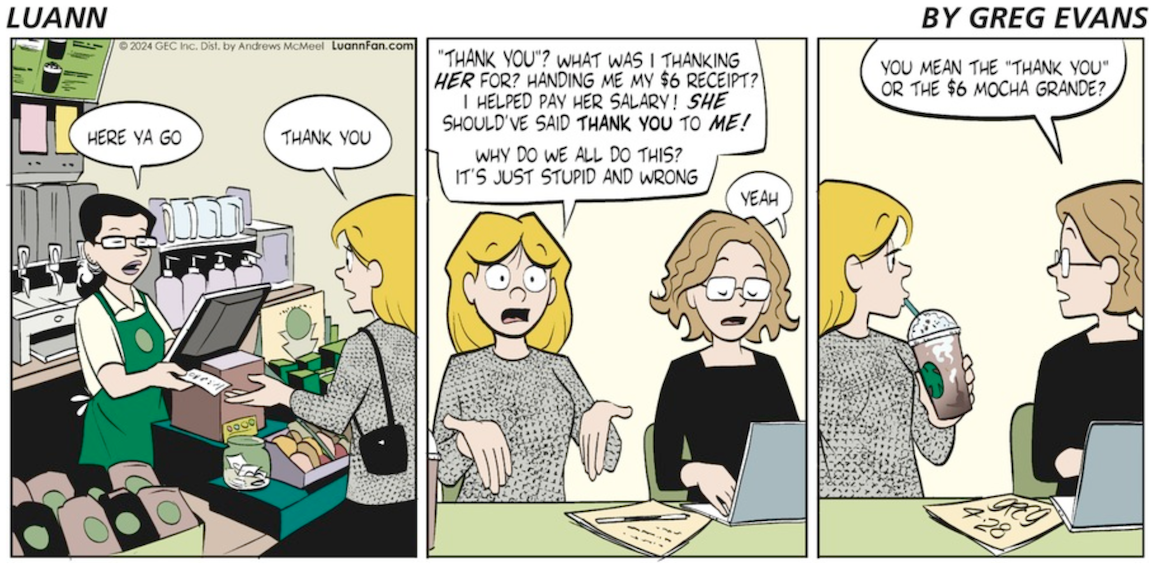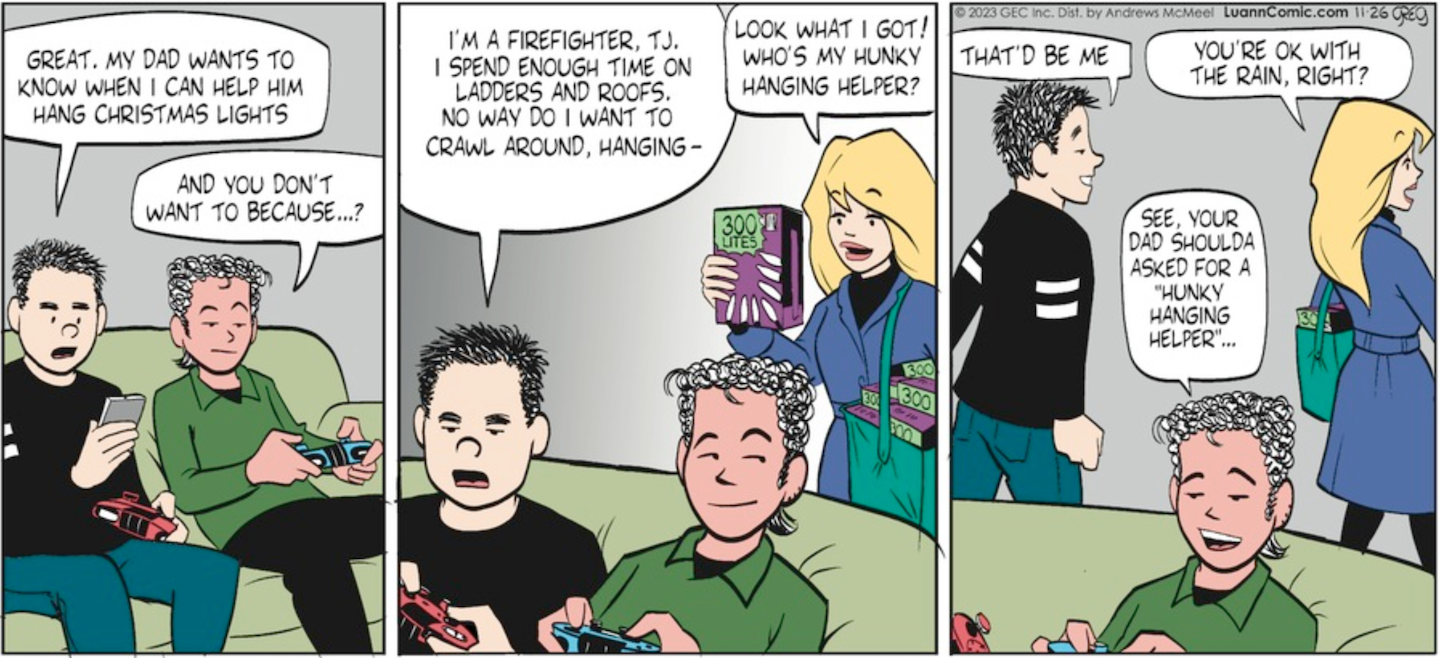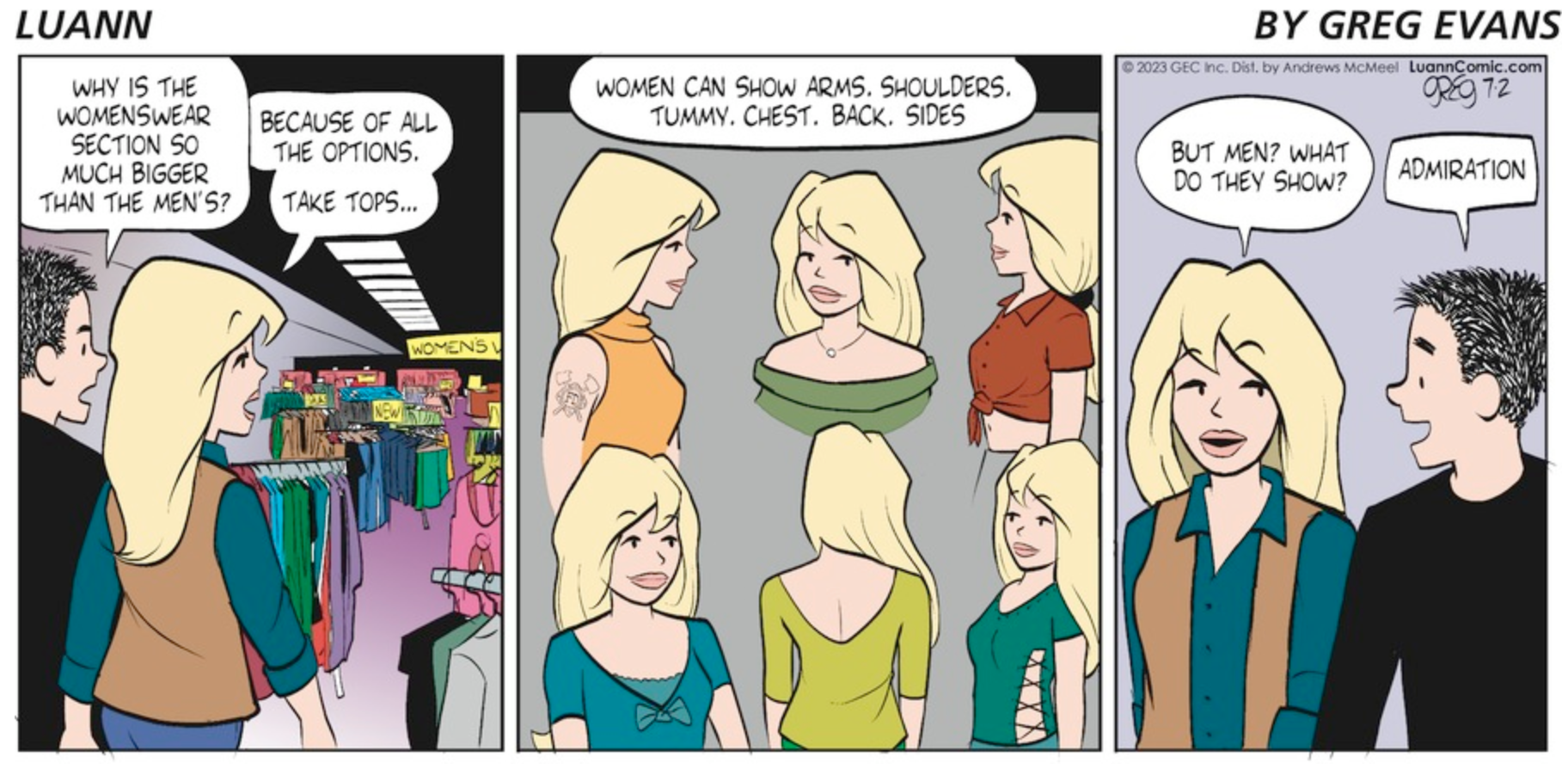Better Luann
The comic strip "Luann" by Greg and Karen Evans relies heavily on sterotypes and tropes as a way of storytelling shorthand. These tropes and implicit assumptions make Luann an interesting subject of critique.
It's just stupid and wrong (4/28/24)
What even is there to say about the 4/28/24 comic? What a horrible way to think about people - that you don't owe someone decency, respect, courtesy just because you gave them money for the service they're doing. Bernice doesn't even challenge this. The butt of the joke is not how horrible and entitled and self-centered Luann is being, but instead an extremely lame joke about coffee prices. I'm truly speechless.

(I also hate the pattern on Luann's shirt. It's weirdly very distracting, I think because it doesn't fit well with the rest of the art style. It looks like you applied one of the metal roofing textures to it in the Sims 3. Also in panel 1 they didn't bother delineating Luann's legs from the rest of the shadow so she hovers or is perhaps doing a little kick lol.)
Nancy (12/23/23)
This is so sad. Nancy deserves better. (12/23/23 comic)

They don't appreciate her
Brad's at it again (11/26/23)
11/26/23 is yet another example of Brad and Toni leading the "that's just how men and women ARE" parade. Brad is willing to do an unpleasant task for his wife when she calls him a "hunky hanging helper" (gross) but not for his father. The implication being that haha men are only motivated by sex/wanting hot women to find them sexually appealing. It just makes me sad.

Bets, Stef, and identity (11/23/23)
This interaction in the 11/23/23 strip (below) struck me as odd for a number of reasons. First of all, it's an odd role to cast Stef into. She doesn't know Bets very well and they're not friends. Stef has also up to now primarily served as the shiny new mean and "vapid" girl as a way to stir up conflict and to highlight how much Tiffany has evolved as a character. While she is being kind of rude here, the question is asked and answered earnestly. Pointing out how making a big decision may threaten someone's sense of identity is a weird thing to do for your roommate you don't know very well and a weird choice to make for your self-centered mean girl.

Their discussion is centered around identity, but the idea of identity is oversimplified. Even Stef can only list two hobbies and her romantic relationship. While of course you can find identity in these things, they seem woefully inadequate to describe the full nuance of someone's internal sense of self. There's also an odd gap left in what's not said. Stef asks who Bets is without social media, and there are a lot of ways to answer that, in many ways more fully than Stef answered. Bets n' Gun is not just a relationship blog, but also a blog about nerd culture, cosplay, and other daily adventures. If it wasn't, Bets wouldn't be able to continue it the whole semester without Gunther. Bets has ambitions to get a degree in economics, she finds her classes easy even when Tiffany found them difficult, and has been shown to have "good" "business sense" in her dealings with her friends. And those are just what's been mentioned - we see nothing of the other friendships and meaningful relationships in her life, nothing of the communities she's a part of.
The purpose of her answer is obviously to set up the conflict as clearly between her selfish love of being in the spotlight on social media and her committing to her relationship with Gunther. But the issue with her and Gunther is largely one of boundaries and communication, not necessarily the evils of social media itself. And then we have the second absence from this conflict: money. Here I refer more to the general story arc rather than this specific strip, but in none of the conversations Bets or Gunther has about their relationship and her social media use is money mentioned. And this is also extremely odd, especially because it's been implied that she supports herself and is not financially supported by her family. Her Bets n' Gun account has a large following and sponsorship deals - at least enough to support her taking a semester off and living off that revenue alone. Deleting her seemingly only current source of income puts her in an extremely vulnerable position, and the comic wants to frame this decision only in terms of her identity and her romantic relationship.
I'm not sure if Stef is supposed to look as sad as she does in the last panel, or if she's sad for the same reason that I'm sad, but it's a fitting end to the discussion.
Brad and Toni (7/2/23)
The Luann strip from 7/2/23 (below) is a good example as to why this comic strip is interesting to view through a critical lens. Brad asks a simple observational question – “why is the womenswear section so much bigger than the men’s?” There are many valid ways of answering this question, and many ways this setup could lead to a sexist punchline. A more outright sexist comic might choose to have that punchline rely on the assumption that women innately like clothes, shopping, fashion when men do not, or perhaps play on a sexist assumption that it’s because women are vain.

Greg and Karen Evans (the authors and artists behind Luann) chose to go in a different direction. Toni points out the ways that women’s clothes are designed to exhibit different parts of a woman’s body. Brad expresses gratitude for this fact (and presumably we’re still supposed to like him). The comic strip answers Brad’s question: the reason there are more clothes in the womenswear department is because women’s bodies are expected to be aesthetically pleasing objects to men. In other words, women’s clothes are meant to exhibit their bodies, whereas men’s clothes are not (we all know the John Berger quote).
It's interesting because the observation and answer given are both true: women are more heavily marketed clothes (and clothes of different types) and one reason behind that is because of the way commercial products reinforce toxic gender roles. Where the comic falls short is the way it presents these gender roles not as a problem, but as a fact of life. Toni doesn’t seem annoyed but amused, and Brad voices his support of these roles outright. Notably, Brad responds that men show “admiration,” which both gets across the point that men are *appreciating* women’s bodies while trying to make it sound more like a compliment. I think it’s gross and I hate Brad, in part because he’s so often used as a mouthpiece for normalizing sexist ideas.
The comic Luann often does exactly this - it bumps up against real issues and then fails to look at them critically. Many of the strips (especially the Sunday one-offs) are meant to hit on a type of “that’s so true” observational humor that ends up reinforcing rather than challenging problematic ideologies.
Also I strongly recommend against reading the full comment section of the 7/2/23 comic strip on gocomics. It’s not a good place.